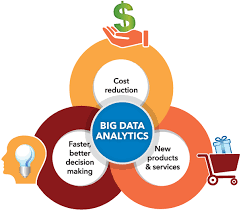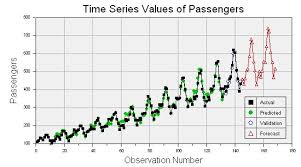The Power of Data Analytics in the Age of Big Data
In today’s digital age, the amount of data generated and collected is growing at an unprecedented rate. This massive volume of data, known as big data, presents both challenges and opportunities for businesses across industries. To make sense of this vast sea of information, organisations are turning to data analytics.
What is Data Analytics?
Data analytics is the process of examining large datasets to uncover hidden patterns, correlations, and insights that can help businesses make informed decisions. By using various techniques and tools, such as statistical analysis, machine learning, and artificial intelligence, data analysts can extract valuable information from big data.
The Role of Data Analytics in Business
Businesses are increasingly realising the importance of leveraging data analytics to gain a competitive edge. By analysing customer behaviour, market trends, and operational processes, companies can identify opportunities for growth, improve efficiency, and enhance decision-making.
Benefits of Data Analytics
There are several key benefits to using data analytics in the age of big data:
- Improved Decision-Making: Data-driven insights enable businesses to make informed decisions based on evidence rather than intuition.
- Enhanced Customer Experience: By analysing customer data, companies can personalise their offerings and provide better service.
- Operational Efficiency: Data analytics can identify inefficiencies in processes and suggest improvements to streamline operations.
- Risk Mitigation: By analysing historical data and trends, organisations can identify potential risks and take proactive measures to mitigate them.
The Future of Data Analytics
As big data continues to grow in volume and complexity, the field of data analytics is evolving rapidly. Advancements in technologies such as artificial intelligence and machine learning are enabling more sophisticated analysis techniques that deliver deeper insights. The future holds great promise for businesses that embrace data analytics as a strategic asset.
In Conclusion
Data analytics plays a crucial role in helping businesses unlock the full potential of big data. By harnessing the power of data analytics tools and techniques, organisations can gain valuable insights that drive innovation, improve efficiency, and fuel growth in today’s competitive marketplace.
Understanding Big Data: Key Questions on Analytics, Challenges, and Ethical Considerations
- What is big data and how is it defined?
- What are the key challenges associated with handling big data?
- How does data analytics help businesses make sense of big data?
- What are the different types of data analytics techniques used in analysing big data?
- How can businesses leverage big data analytics to improve decision-making processes?
- What role does artificial intelligence play in analysing and interpreting big data?
- What are the ethical considerations surrounding the use of big data in analytics?
What is big data and how is it defined?
Big data refers to the vast amount of structured and unstructured data that is generated at an unprecedented scale in today’s digital world. This data comes from a variety of sources, including social media, sensors, mobile devices, and more. The definition of big data is often characterised by the three Vs: volume, velocity, and variety. Volume refers to the sheer amount of data being produced, velocity relates to the speed at which data is generated and processed, and variety encompasses the different types of data sources available. Understanding big data and its definition is essential for businesses looking to leverage advanced analytics techniques to extract valuable insights and drive informed decision-making processes.
What are the key challenges associated with handling big data?
Handling big data presents several key challenges for organisations. One of the primary issues is the sheer volume of data generated, which can overwhelm traditional data processing systems. Ensuring data quality and accuracy is another significant challenge, as big data often comes from diverse sources and may contain inconsistencies or errors. Scalability is also a concern, as organisations need to have the infrastructure and resources to store, process, and analyse large amounts of data efficiently. Additionally, maintaining data security and privacy in the face of increasing cyber threats poses a critical challenge for businesses looking to leverage big data effectively. Addressing these challenges requires a strategic approach that combines advanced technologies, skilled professionals, and robust data management practices.
How does data analytics help businesses make sense of big data?
Data analytics plays a vital role in helping businesses make sense of big data by providing the tools and techniques necessary to extract valuable insights from vast amounts of information. Through the use of statistical analysis, machine learning algorithms, and data visualisation methods, data analytics enables organisations to uncover hidden patterns, trends, and correlations within big data sets. By transforming raw data into actionable intelligence, businesses can make informed decisions, identify opportunities for growth, optimise operations, and gain a competitive edge in today’s data-driven world.
What are the different types of data analytics techniques used in analysing big data?
In the realm of analysing big data, various types of data analytics techniques are employed to extract meaningful insights and patterns from vast datasets. These techniques include descriptive analytics, which focuses on summarising historical data to provide context and understand trends; diagnostic analytics, which aims to identify the root causes of past events or trends; predictive analytics, which uses statistical algorithms and machine learning to forecast future outcomes based on historical data; and prescriptive analytics, which goes a step further by recommending actions to optimise outcomes based on predictive models. Each of these data analytics techniques plays a crucial role in unlocking the potential of big data and guiding strategic decision-making for businesses across industries.
How can businesses leverage big data analytics to improve decision-making processes?
Businesses can harness the power of big data analytics to enhance their decision-making processes by utilising advanced analytical tools and techniques to extract valuable insights from large datasets. By analysing vast amounts of data, businesses can uncover patterns, trends, and correlations that may not be apparent through traditional analysis methods. This enables companies to make more informed decisions based on data-driven evidence rather than relying solely on intuition or past experiences. Leveraging big data analytics empowers businesses to identify opportunities for growth, mitigate risks, and optimise operational efficiency, ultimately leading to more strategic and effective decision-making across all levels of the organisation.
What role does artificial intelligence play in analysing and interpreting big data?
Artificial intelligence (AI) plays a pivotal role in analysing and interpreting big data by automating and enhancing the data processing capabilities of organisations. AI technologies, such as machine learning algorithms and natural language processing, enable the efficient handling of vast datasets that would be impossible to manage manually. These technologies can identify patterns, trends, and anomalies in data with remarkable speed and accuracy, providing valuable insights for decision-making. AI also facilitates predictive analytics, allowing businesses to forecast future trends based on historical data. By leveraging AI in big data analytics, companies can gain deeper insights into their operations and customer behaviours, ultimately leading to more informed strategic decisions and a competitive edge in the market.
What are the ethical considerations surrounding the use of big data in analytics?
Ethical considerations surrounding the use of big data in analytics have become a prominent topic of discussion in today’s digital landscape. As organisations harness the power of vast amounts of data to drive decision-making and innovation, questions arise regarding privacy, consent, transparency, and fairness. Issues such as data security, potential biases in algorithms, and the responsible handling of sensitive information are critical aspects that must be carefully addressed. Striking a balance between utilising big data for beneficial purposes while upholding ethical standards is essential to ensure trust and accountability in the realm of data analytics.






